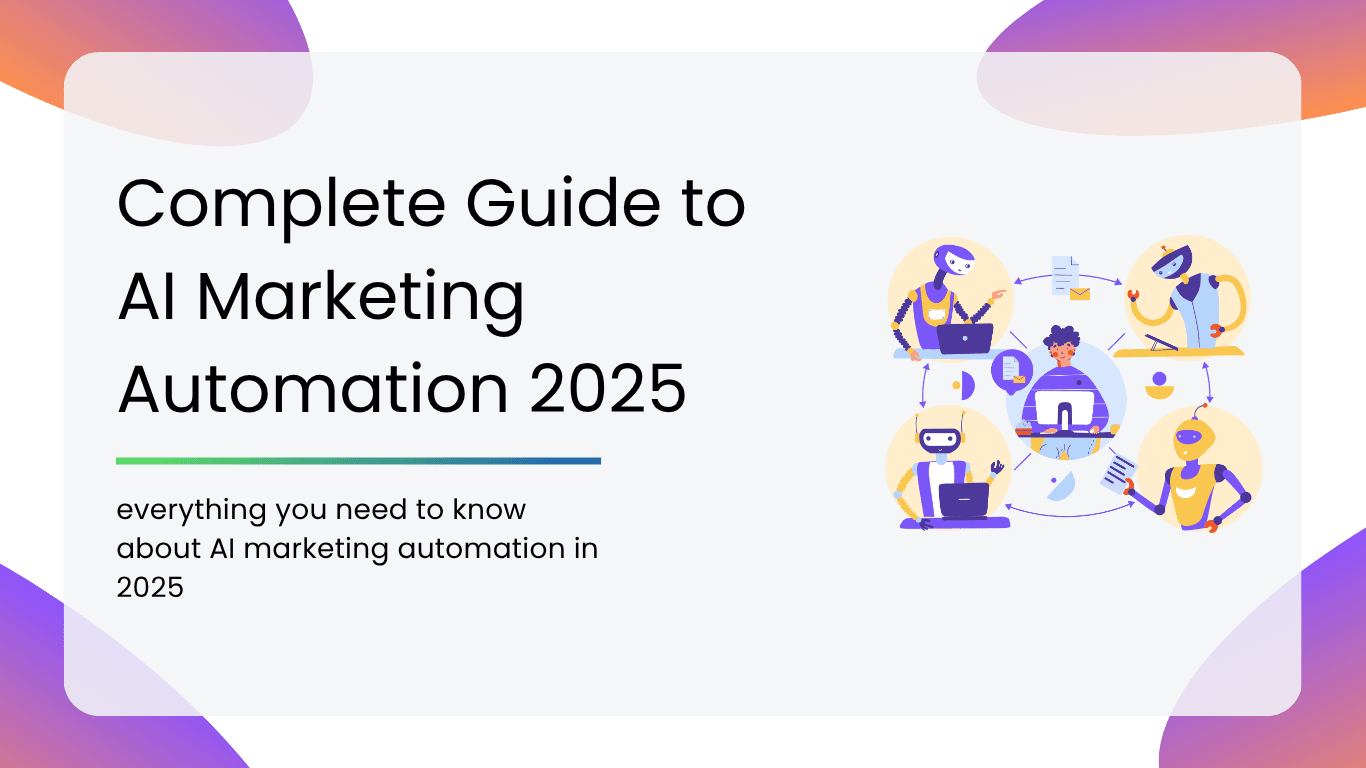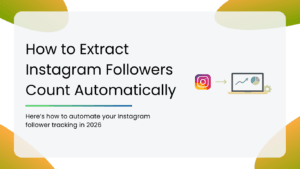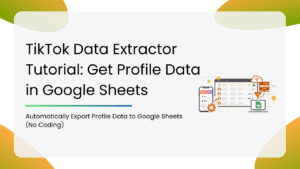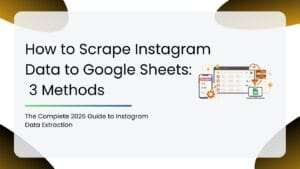AI is changing the game in marketing. From personalized emails to predictive analytics, artificial intelligence is making it easier than ever to scale your marketing efforts without losing the human touch.
In 2025, AI marketing automation isn’t a futuristic concept, it’s a must-have strategy. Whether you’re running a startup or managing a growing brand, AI tools are helping marketers do more with less.
In this guide, we’re breaking down everything you need to know about AI marketing automation in 2025: what it is, how it works, and how to get started. Let’s dive in.
What is AI Marketing Automation?
AI marketing automation includes the use of artificial intelligence, such as machine learning, natural language processing, and smart data analysis, to automate, optimize, and personalize your marketing efforts in real time.
AI automation is smart. It watches, learns, and evolves. It studies customer behavior, predicts what your audience is most likely to do next, and automatically tailors your strategy accordingly, without any manual intervention.
Core Benefits of AI Marketing Automation
So what’s the big deal about AI in marketing automation? Let’s break down exactly what makes it a total game-changer in 2025.
- Personalization at Scale: AI analyzes user data to deliver personalized content, offers, and product recommendations, automatically and at scale.
- Predictive Analytics: AI predicts trends, customer behavior, and campaign results before they happen, helping you make smarter decisions.
- Real-Time Optimization: AI tweaks things like timing, content, and delivery channels to get the best results while the campaign is still running.
- Audience Segmentation: AI groups people by interests, behavior patterns, purchase intent, and more to build micro-targeted segments to convert better.
- Conversational AI: From answering queries to driving sales, AI-powered chatbots and virtual assistants are handling customer interactions 24/7.
- Predictive Campaign Planning: With predictive analytics, AI forecasts campaign performance based on past data, audience behavior, and real-time trends.
- Improved ROI: AI automates the busywork, cuts down errors, and boosts campaign efficiency. That means better ROI with no long hours of work or planning.
- Real-Time Adaptability: Market shifts, trends come and go, and customer preferences change overnight. AI-powered tools monitor these changes as they happen and adjust your campaigns in real time.
Why AI Marketing Automation Matters in 2025
2025 isn’t business as usual. The way customers interact with brands has completely changed, and so have their expectations. People expect instant responses, hyper-personalized experiences, and seamless journeys across channels, devices, and platforms.
The Digital Landscape Is Moving Fast
With more data and several channels, marketers are under pressure to do more with less time, less budget, and fewer human hands. That’s where AI marketing automation steps in.
It doesn’t just save time, but makes your marketing smoother and more efficient. You get to automate and optimize your entire funnel in real time.
AI Has Gotten Smarter
Today, AI can write your ad copy, analyze millions of data points in seconds, and even predict your customer’s next move before they make it. With the advancements in generative AI, machine learning, and deep learning, AI marketing automation is your co-pilot. It helps you:
- Generate fresh content that performs
- Spot patterns and opportunities you might miss
- Continuously improve your campaigns without having to set every rule manually
A Serious Competitive Edge
Companies that adopt AI early leap ahead in the game. They move faster, personalize better, and convert higher. By the end of 2025, AI marketing automation will be a basic requirement for staying relevant.
So if you’re not tapping into it yet, now’s the time to start. Your competitors probably already are.
How to Implement AI Marketing Automation in Your Business
Ready to put AI to work? Here’s a roadmap to help you get started.
1. Define Your Marketing Objectives
Before you get into tools and tech, think about what you really want AI to do for your marketing team. Are you looking for more leads or better conversion rates?
Start with the outcome, and work backwards. Clear goals will shape the tools and strategies you choose.
2. Audit Existing Workflows
Look at the current marketing workflows, like email campaigns, customer journeys, analytics reporting, lead scoring, etc. What’s working for you and what’s not?
This audit helps pinpoint where AI can make the biggest impact.
3. Identify Automation-Ready Areas
Not every task needs AI. Focus on high-volume, repetitive processes that eat up your team’s time, identifying prime areas where AI can take over.
4. Integrate AI Capabilities Into Your Content System
Look for AI tools that seamlessly integrate with your existing CRM, email platforms, and analytics tools. Start small with plug-and-play integrations that don’t feel overwhelming.
Pilot with one channel or campaign before scaling.
5. Train Your Team
Even the smartest AI is useless if no one knows how to use it. Invest in training so your team understands both the tools and the strategy behind them.
Set clear guidelines for how AI will be used, what decisions it can make, and when human review is required.
6. Monitor, Refine, and Scale
AI thrives on feedback, and so should your strategy. Track performance closely, refine your approach, and continuously feed your system fresh data.
As you learn what works, you can scale your automation efforts across more channels and campaigns.
Use Cases of AI Marketing Automation
Here’s how businesses are putting AI Marketing Automation to work today:
1. Email Campaign Personalization
With AI, brands can tailor every subject line, product recommendation and send them to each individual automatically. These are dynamic emails that adapt in real time based on user behaviour, location, or even predicted intent.
2. Chatbot-Assisted Lead Nurturing
AI-powered chatbots can qualify leads, answer nuanced questions, guide users to the right product or service and hand off warm leads to your sales team when the time is right.
3. AI-Driven Content Recommendations
From blog posts to product suggestions, AI can surface the right content to the right user at the right time. Based on browsing behaviour, purchase history, or engagement patterns, recommendation engines boost engagement and keep users moving down the funnel.
4. Behavior-Based Retargeting
AI identifies intent signals and tailors retargeting based on user behaviour. Visited the page twice but didn’t convert? They’ll get a different message than someone who bounced after five seconds.
5. Dynamic Customer Journey Mapping
AI helps map out responsive customer journeys that shift with each user’s actions. AI can adjust messaging, timing, and channel based on where someone is in their journey.
What Are the Emerging Trends and Advancements in AI Marketing Automation?
AI marketing automation is evolving fast, and 2025 is shaping up to be a breakout year. We’re moving beyond simple rule-based automation to AI that’s more autonomous, creative, and customer-centric. Here’s what’s ahead:
1. Hyper-Precision in Ad Targeting
AI algorithms are now refining ad placements down to context, mood, and moment. Think of ads that adapt in real-time based on user sentiment or behavioral shifts.
2. Next-Gen Chatbots with Brains
Today’s AI chatbots do more than answer FAQs. They qualify leads, personalize conversations, and even close sales. In 2025, expect bots that remember user preferences, interpret tone, and handle complex support flows.
3. Predictive Everything
From forecasting campaign success to anticipating customer churn, predictive analytics is taking center stage. AI will soon alert you before performance drops, not just after.
4. Multimodal AI for Smarter Content
AI tools are now combining text, image, and video generation, meaning you can brief one platform and get a full campaign asset kit in return. Visuals, captions, CTAs, all generated, A/B tested, and optimized, everything included.
5. Autonomous Marketing Flows
We’re entering an era where AI doesn’t just suggest, it acts. Tools will soon adjust budgets, re-segment audiences, and reroute user journeys in real time, based on live behavior.
In short, AI in marketing isn’t just a tool anymore. It’s turning into a dynamic teammate.
Challenges and Considerations of AI Marketing Automation
Like any powerful tool, AI Marketing Automation comes with some hurdles you should know about before getting started.
- Ethical and Privacy Concerns: AI relies heavily on data, so it’s crucial to respect privacy regulations like GDPR and CCPA. Transparency about data and getting clear consent are non-negotiable.
- Algorithm Transparency: AI can inherit biases from the data it’s trained on. That means it can unintentionally favor certain audiences or miss others, creating fairness issues. So, keep an eye on your AI’s decisions.
- Integration Hurdles: Older CRMs, databases, and platforms can resist seamless AI integration. Plan for time, resources, and expert help when merging AI with your existing infrastructure.
- Balancing Automation with Human Creativity: AI can handle repetitive tasks and data crunching, but it can’t replace human creativity, intuition, or human intelligence. The best marketing strategy will combine the efficiency of AI with the nuance and touch that only people can bring.
Starting to integrate AI-driven automation in 2025 isn’t just about keeping up; it’s about getting ahead. Early adopters will unlock competitive advantages that can transform customer engagement and drive better ROI.
But remember, AI isn’t here to replace marketers, it’s here to help them. The real magic happens when human creativity meets AI’s precision and scale. Together, they form a powerful partnership that will define the future of marketing.
If you found this guide helpful, don’t forget to check out our other AI-focused blogs on Smacient. We’ve got blogs that will let you be ahead of the curve in 2025:
- Top 17 AI Tools for LinkedIn in 2025
- Best AI Video Avatar Generators Online in 2025
- 10 Best AI Web Scraping Tools in 2025
FAQs
AI Marketing Automation uses artificial intelligence to streamline, optimize, and personalize marketing tasks like data analysis, campaign management, and customer engagement.
Absolutely! AI tools are more accessible and affordable than ever. Small businesses can start small by automating routine tasks and gradually expand as they grow.
Don’t expect AI to be a magic fix overnight. Avoid neglecting data quality, skipping training, and ignoring privacy rules. Also, don’t lose sight of the human touch as AI works best as a support, not a replacement.
No. AI handles data-heavy and repetitive tasks, but creativity, empathy and strategic thinking are irreplaceable. AI is here to boost marketers, not take their jobs.
